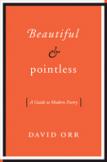Something to Love
The title of this book seems to be debunking its subject, modern poetry. But David Orr, poetry columnist for The New York Times Book Review, is debunking instead the classic arguments for the importance of poetry and admitting, up front, the insignificant status it is accorded today. We are not won to poetry by arguments for it, says Orr, but by being hooked on it. In his own case, a poem called “Water,” by Philip Larkin, did the magic. After all, he points out, “small unnecessary devotions” are what constitute a life. Just notice how people talk about poetry. You don’t just like it, if you are a reader; you love it.
The subtitle is also crafty. One expects a charting of the actual field with its major players. The author, however, holds off from rankings or evaluations of greatness because U.S. poetry, as a system, is so “enormous and protean,” such a fishbowl.
Many of its writers at this late date are still intent on style, distinctive phrasing or what Orr calls “the ‘Poetry as Super Language’ school of thinking.” Robert Lowell set the bar for fine writing half a century ago. But Lowell’s friend Elizabeth Bishop, whose diction is more relaxed, less polished, finds more favor today, especially among the many who “aim for a new style by abandoning traditional form.” Among these, Orr admits, “anything they write will inevitably disappoint an audience conditioned to associate poetry with sublimity.”
The author takes us behind the scenes in Poetryland (his term). Most universities have creative writing programs, staffed by poet teachers. Their academic tenure may be uncertain, but they are drawn to “the art form’s rambunctious, impassioned history of oddball behavior and outrageous self-promotion.” The poetry of the past, Orr comments, “was often a cliquish mess,” so writers are better off now in a more democratic regime, with multiple readings and publications. Current conditions do have a downside; they feed careerism and a “unique blurb culture” that has grown “ever more exquisitely ridiculous.”
In a postmodern climate, the poetic lyric, according to W. R. Johnson in The Idea of Lyric, “has moved from an ‘I’ speaking to a ‘You’ to an ‘I’ speaking to itself or to nothing.” Still, ordinary readers are drawn to the personal in poetry. Even when the writing is not confessional and handles its subject impersonally, the reader tends to find it revealing, something “overheard rather than heard.”
The long study required to read so much of today’s poetry builds into “a relationship,” the author maintains. And he concludes wistfully that this “small, vulnerable human activity” needs as much as ever to be loved.
This article also appeared in print, under the headline “Something to Love,” in the September 19, 2011, issue.








